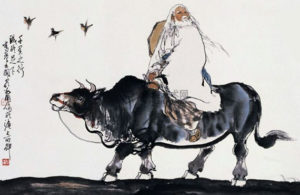Part of the Processwork training which I really enjoy is learning something of the skills of Daoism.

http://www.taoists.co.uk/main_files/events.htm
Taoism also known as Daoism, is a religious or philosophical tradition of Chinese origin which emphasizes living in harmony with the Tao (Chinese: 道: Dào; literally: “the Way”, also romanized as Dao). The Tao is a fundamental idea in most Chinese philosophical schools; in Taoism, however, it denotes the principle that is the source, pattern and substance of everything that exists. Taoism differs from Confucianism by not emphasizing rigid rituals and social order. Taoist ethics vary depending on the particular school, but in general tend to emphasize wu wei (effortless action), “naturalness”, simplicity, spontaneity, and the Three Treasures: 慈 “compassion”, 儉 “frugality”, and 不敢為天下先 “humility”.
The first (lower) vehicle: doing good deeds
The second (middle) vehicle: ritual ceremony
The third (higher) vehicle: techniques and postures – internal alchemy
Youtube: Motions of the Tao
The roots of Taoism go back at least to the 4th century BCE. Early Taoism drew its cosmological notions from the School of Yinyang (Naturalists), and was deeply influenced by one of the oldest texts of Chinese culture, the I Ching, (Book of Changes c.1000 – 750 BCE) which expounds a philosophical system about how to keep human behavior in accordance with the alternating cycles of nature. The “Legalist” Shen Buhai (c. 400 – c. 337 BCE) may also have been a major influence, expounding a realpolitik of wu wei.
The Tao Te Ching, a compact book (6th C BCE) containing teachings attributed to Laozi (Chinese: 老子: Lǎozǐ: (Lao Tzu), is widely considered the keystone work of the Taoist tradition, together with the later writings of Zhuangzi / Chuang Tsu, (Master Tzu) including the Book of Chuang Tzu (4th C BCE).
Youtube: Spirit of Asia : The Way of Taoism: Restoring the Life Force
James Leachman O.S.B. 28 February 2018